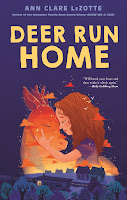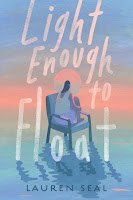October 1, 2024 by Scholastic Press
E ARC provided by Edelweiss Plus
In this novel in verse, we meet Effie, who is Deaf and has a difficult housing situation. While her older sister Deja is supportive, her father is not. He does not know sign language, and is reluctant to take the time to write down what he wants to say, so he does not communicate with Effie. Not only that, but the trailer in which the three live is dirty, and Effie often doesn't get enough to eat, and often wears dirty clothes. She and Deja had lived with their mother and her stepfather Nick, but when the mother tired of dealing with Effie, she sent both girls away. School is also not easy, but there is a bright spot; Miss Kathy, Effie's interpreter. Effie is able to chat with her in a way that she can't with anyone else. Effie is a b it behind in school because she did not have adequate technology during the pandemic to keep up with her studies, but Miss Kathy is very good at helping her. Effie appreciates that Miss Kathy doesn't overstep, and leaves Effie plenty of autonomy in making choices. This is in contrast to Cait, who is in a wheelchair because of cerebral palsy; her assistant, Olivia, is pushy and doesn't give Cait the freedom she would like. Cait and Effie become friends, and Cait works hard to learn American Sign Language. Effie's teacher, Mr. Bart, also acknowledges that Effie's use of language is influenced by the syntaxt of ASL, and says that it makes her writing seem poetic. He encourages her to write more. Effie is very concerned about the local wildlife near her home, since new developments are going in, and the increased traffic brought by these new dwellings has resulted in the death of some deer. After a home visit, Miss Kay surprises Effie by asking if she would like to live with her for a while. The father agrees, and Effie enjoys having enough to eat, clean clothes, and a stable environment. After a month, Miss Kay tries to get custody of Effie, and the father fights. The mother does not, because some untoward things have happened between Effie and Nick, and with Miss Kathy's help, law enforcement gets involved. The mother also claims that Effie can hear a little and should be able to speak, but when the father refers to the girls in court as "the retards" (Deja has a learning disability) and claims that they treat it as a joke, custody is quickly given to Miss Kathy. This story is based, in part, of one that LeZotte read in the news in 1995.
Strengths: Effie's plight is one that many readers will not have encountered; imagine the feeling of isolation and frustration if they people who cared for you as a child could not communicate with you. Effie's struggles are well portrayed, and it is a huge relief to see that she does have a support person in Miss Kathy. The neglect is realistically portrayed, and the abuse is mentioned in very matter of fact terms that don't go into a lot of details. Cait's attempts at learning sign language are good to see; there has been one deaf student at my school, but when she was enrolled, I had to buy several sign language books, because her classmates were very interested in learning ASL and communicating with her. There's a happy ending after Effie's many struggles, and her classmates even promise to help however they can with the problem with the deer.
Weaknesses: While I applaud LeZotte's interest in preserving wildlife in developing suburbs, it didn't fit into the story that well. Since there are so few characters in middle grade literature with cerebral palsy, I would have loved to see more of Cait's story work its way into the narrative instead.
What I really think: This is a good choice for readers who were interested in the topics presented by Bradley in Fighting Words or Lowell's The Road to After, or who would like some insight into Deaf Culture. There are relatively few books on that topic, but I do recommend Cerra's Hear Me. Seal, Lauren. Light Enough to Float
publication October 8, 2024 by Rocky Pond Books
E ARC provided by Edelweiss Plus
Weaknesses: While I applaud LeZotte's interest in preserving wildlife in developing suburbs, it didn't fit into the story that well. Since there are so few characters in middle grade literature with cerebral palsy, I would have loved to see more of Cait's story work its way into the narrative instead.
What I really think: This is a good choice for readers who were interested in the topics presented by Bradley in Fighting Words or Lowell's The Road to After, or who would like some insight into Deaf Culture. There are relatively few books on that topic, but I do recommend Cerra's Hear Me. Seal, Lauren. Light Enough to Float
publication October 8, 2024 by Rocky Pond Books
E ARC provided by Edelweiss Plus
This Young Adult novel in verse follows the path of Evie, a fourteen year old struggling with anorexia. When her parents finally take her to the doctor for tests, it's determined that she is quite ill, and her mother takes her to a residential facility to be treated. The mother has not told Evie about this first, and Evie misses her dog, her sister Wren, and her best friend Darcy, whom she is not sure what to tell. For four months, Evie is in the facility, increasing the number of calories she consumes, being monitored for exercise, and undergoing both group and personal therapy. Along with the eating disorders, Evie struggles with self harm issues, and frequently scratches her head until it bleeds. She connects with several of the other residents. The others in her unit are from an array of personal background and suffer from a variety of eating disorders, and most are older than Evie. Evie does have some day passes, and has ups and downs as she tries to work through self image and control problems. Eventually, she comes to the realization that "food becomes glucose becomes energy becomes time for..." important things in her life like walking her dog Harlow or being a better sister. Eventually, she has changed her thoughts and behavior enough that she can return home, but still has access to therapy and she adjusts to being back home and dealing with her emotional issues instead of trying to hide them.
I appreciated that this started with a diagnosis and entry into a psychiatric program, and that, while Evie struggles for a long time, she eventually finds ways to control her eating. This is based on the author's own experiences.
A couple of things to note; there is not capitalization, and there are several uses of the f-word. This is very poetic in its language, even though the form is nonmetered free verse. It is very intensive, and does a good job of listing trigger warnings at the beginning. It's a good book to replace Levenkron's The Best Little Girl in the World in high school libraries. Depending on your collection development policies, it might be okay for some middle school libraries, but I will probably pass on purchase.
I appreciated that this started with a diagnosis and entry into a psychiatric program, and that, while Evie struggles for a long time, she eventually finds ways to control her eating. This is based on the author's own experiences.
A couple of things to note; there is not capitalization, and there are several uses of the f-word. This is very poetic in its language, even though the form is nonmetered free verse. It is very intensive, and does a good job of listing trigger warnings at the beginning. It's a good book to replace Levenkron's The Best Little Girl in the World in high school libraries. Depending on your collection development policies, it might be okay for some middle school libraries, but I will probably pass on purchase.


No comments:
Post a Comment